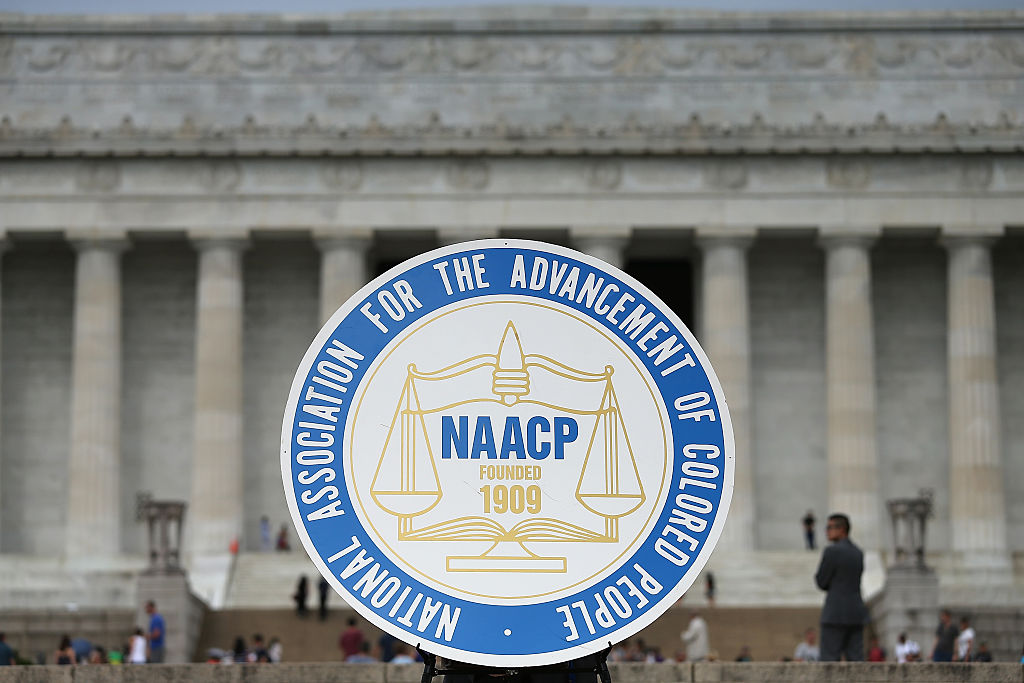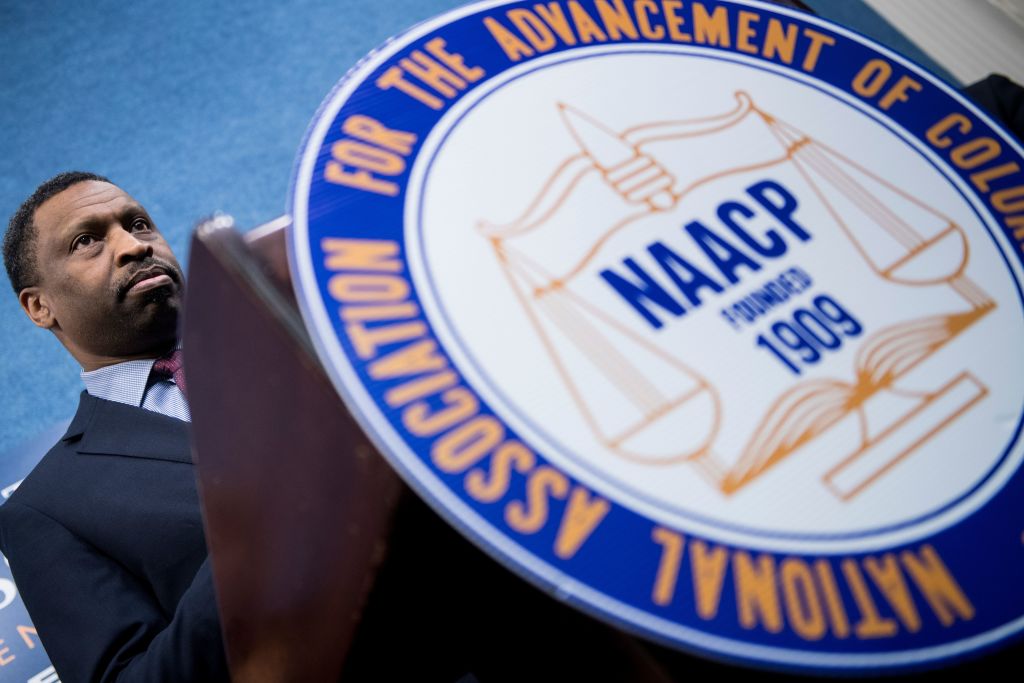
Source: Win McNamee / Getty
The nation’s oldest civil rights organization on Tuesday filed a lawsuit citing the nation’s oldest hate group and alleging that the former president, his lawyer and far-right extremist groups violated a law that is nearly 150 years old.
Citing the Ku Klux Klan Act of 1871, Mississippi Rep. Bennie Thompson brought the legal action against Donald Trump, Rudy Giuliani as well as the Proud Boys and the Oath Keepers on behalf of the NAACP “for conspiring to prevent him and other Members of Congress from discharging these official duties” in relation to the attempted coup at the U.S. Capitol on Jan. 6.
CLICK HERE TO DOWNLOAD OUR APP AND TAKE US WITH YOU ANYWHERE!
All of them have been accused of either inciting or participating in the violence that resulted in at least six deaths and interrupted Congress convening to certify the election of Joe Biden.
The lawsuit accuses them of violating the Ku Klux Klan Act of 1871, which “was intended to protect against conspiracies, through violence and intimidation, that sought to prevent Members of Congress from discharging their official duties.” The Ku Klux Klan Act of 1871 was originally established to protect Black people from white supremacy-waged violence.
“The Defendants conspired to prevent, by force, intimidation and threats, the Plaintiff, as a Member of Congress, from discharging his official duties to approve the count of votes cast by members of the Electoral College following the presidential election held in November 2020,” the NAACP’s lawsuit says.
The lawsuit also reminds anyone reading it that the Ku Klux Klan Act of 1871 “was enacted in response to violence and intimidation in which the Ku Klux Klan and other organizations were engaged during that time period.”
It was yet the latest legal action taken against Trump as state’s and district attorneys investigate the former president for his interference in the 2020 election and well as his finances.
With Trump’s Senate impeachment acquittal on Saturday, there is seemingly nothing preventing another disgruntled “also-ran” from inciting violence under disingenuous pretenses of unproven election fraud allegations. The NAACP’s lawsuit aims to address that distinct possiblity, NAACP President and CEO Derrick Johnson said.
“If we don’t put a check on the spread of domestic terrorism, it will consume this nation and transform it to something that none of us recognize,” Johnson told Politico about the lawsuit. “We must, as a nation, prevent the spread of this type of boldness where [insurrectionists] will go to our U.S. Capitol and seek an act of treason.”

Derrick Johnson, President and CEO of the NAACP. | Source: BRENDAN SMIALOWSKI / Getty
The Office of the Historian and the Clerk of the House’s Office of Art and Archives defines the Ku Klux Klan Act of 1871 as being “designed to eliminate extralegal violence and protect the civil and political rights of four million freed slaves. The 14th Amendment, ratified in 1868, defined citizenship and guaranteed due process and equal protection of the law to all. Vigilante groups like the Ku Klux Klan, however, freely threatened African Americans and their white allies in the South and undermined the Republican Party’s plan for Reconstruction. The bill authorized the President to intervene in the former rebel states that attempted to deny ‘any person or any class of persons of the equal protection of the laws, or of equal privileges or immunities under the laws.’ To take action against this newly defined federal crime, the President could suspend habeas corpus, deploy the U.S. military, or use ‘other means, as he may deem necessary.’”
The Ku Klux Klan began its reign of terror in Tennessee in 1865. Early on, it was a group made of largely southern Democrats who rallied against Black and white Republicans in the South and championed the suppression of equal rights for all. With many members enraged by the Reconstruction of the South after the events of the Civil War, Blacks would be terrorized by the Klan for decades to come. By the 1870s, Klan members began to attack Black voters, which forced Republicans in Congress to pass laws that protected the rights of African Americans.
The Ku Klux Klan Act of 1871 became law on April 20 of that year, less than a month after it was introduced in the House.
Aside from the new lawsuit, Trump is the subject of a criminal investigation by Fulton County District Attorney Fani Willis for his insistence that Georgia’s secretary of state illegally find thousands of votes in order to overturn Biden’s election victory in the state.
In a statement shortly after the Jan. 6 attack on the U.S. Capitol, New York Attorney General Letitia James suggested the existence of instances involving the issuance of pardons would open Trump up to prosecution. Noting the potential presence of “corrupt circumstances,” James reiterated that state and local investigations would not be affected. She is also investigating whether the Trump organization lied about the value of its assets.
Manhattan District Attorney Cyrus Vance is also investigating the possible criminal activities of the Trump Organization including bank, tax and insurance-related fraud.
SEE ALSO:
Meet Fani Willis, The Latest Powerful Black Woman Moving To Hold Trump Accountable
NY AG Letitia James Might Succeed Where Senate Impeachment Trial Falls Short
Follow @‘magicbaltimore’The Ku Klux Klan Act of 1871 Explained As NAACP Sues Trump, Proud Boys For Violating It was originally published on newsone.com

















